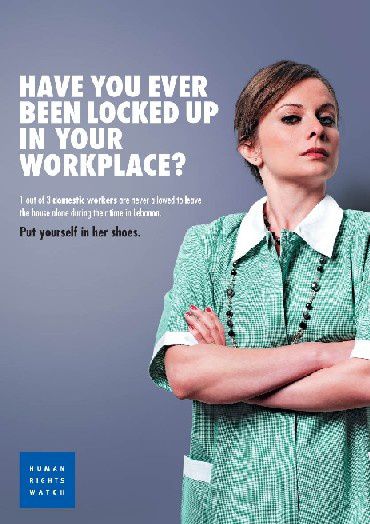An event on domestic slavery took place on Wednesday morning organized by the Comité Contre l'Esclavage Moderne and a small event-association, with an intervention of Georgina Voz Cabral and two previous presidents of the CCEM. And there was an exposition as well. From 9h30 to 13h an imposing room of the Mairie of the 4th district was the scene of a podium discussion of "domestic slavery". Of course, not many visitors could be awaited at such an inconvenient hour, so I guess it was not meant to be a big media event.
The CCEM, located in the Parisian 11th arrondisment, helps out petits bonnes (this is the terminology they use) and victims of domestic slavery in France. A social worker and a pool of lawyers are at the disposition of these women. They help out women, victims of "domestic slavery", help them psychologically and in the administrative and legal process of suing their "enslavers", the only way these women get a visa to stay in France.
The actual founder of the CCEM we met on another occasion, on a meeting of a new association engaged in the fight against "modern slavery": reagir dans le monde Dominique Torres has written two books on slavery, "the first one in a trance", after she was confronted with the phenomenon during her work as a journalist in Africa.

In Torres' point of view, the difference between exploitation and slavery is that the slave has no determination over his own life. Her latest book Tu es libre, which has had good critics, deals with a young boy who is freed, discovers freedom, .needs to learn how to live on his own and make choices. Torres uses a concept of slavery to describe generally the plight of women, men and children. Even if the problem is always the same one, her solutions are adapted to the different realities. In Nigeria, she tells us, it is necessary to liberate economically families, to eradicate slavery. In the case of Lebanon, Torres thinks it is necessary to lobby for the passing of a legislation to regulate domestic work.
Finally, a manifestation took place on a hot Parisian Saturday at 14h in the afternoon. Not very full, but well visited. Specially the CRAN (Conseil Représentatif des Associations Noires) had called out for this demonstration under the slogan L'esclavage est aboli pas les préjuges . There was also an old man with the sign "les chaînes sont dans ta tête".





